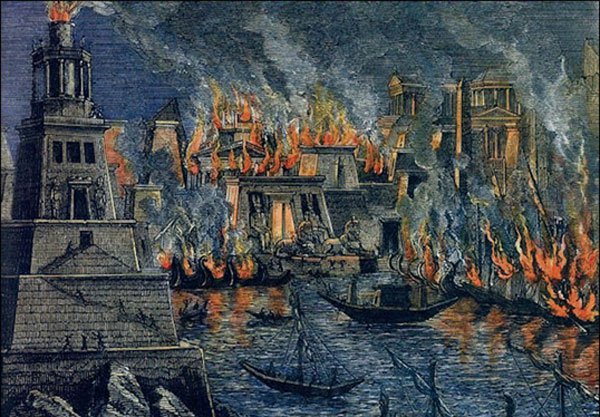 Who told us that Christian mobs were responsible for destroying the Great Library of Alexandria?
Who told us that Christian mobs were responsible for destroying the Great Library of Alexandria?
I had long thought it was true. I must have heard or read it somewhere, sometime when I was still a Christian. Such a factoid made no difference to my faith, no doubt, if only because I had long known that not all professing Christians have always behaved like saints. (Somewhere along the way I learned otherwise, but I never felt I or anyone else had believed in the rampaging Christian mob story for any sinister and diabolical reasons.)
But recent chastisements, one (or two) from an atheist, the other from a Christian, directed against atheists (no-one else, only atheists) for holding on to this bit of apparently false belief (the accusation being that they believe it for no better reason than that they hate Christianity and want to believe anything that casts Christianity in a bad light) have led me to try to find the source of this “misinformation”.
A visit to the virtual archive of the internet turned up the following:
The image of incensed early Christian mobs destroying Greco-Roman temples comes in part from the early modern period. Back in the late 18th century, armchair historian Edward Gibbon provided a view of temple destruction that had lasting repercussions. In his epic work, History of the Decline and Fall of the Roman Empire he described the tearing down of the Serapeum in Alexandria as illustrative of the empire as a whole. He also described it as a direct assault on Roman idolatry:
“The compositions of ancient genius, so many of which have irretrievably perished, might surely have been excepted from the wreck of idolatry for the amusement and instruction of succeeding ages.”
Sarah Bond, Were Pagan Temples All Smashed Or Just Converted Into Christian Ones?
I like that “armchair historian” bit.
In the mouth of at least two witnesses . . .
Ever since Edward Gibbon’s vivid account of the destruction of the Serapeum in Alexandria at the hands of Christians, scholars have tended to view the conversions of temples into churches as clear manifestations of an intolerant Church wishing to express its triumph over paganism. Feyo L. Schuddeboom, The Conversion of Temples in Rome
Of course. Well, that makes some sense. I did read Gibbon’s Decline and Fall many years ago and that was probably what planted that “vicious little anti-Christian lie” into my head. Presumably many other readers of the same work, atheists and others, picked up the same notion.
We have all fallen in with the “prevalent proof” fallacy at times. We believe something for no better reason than that it is what we read, or what other people say and everyone seems to take for granted — or at no-one makes a fuss with a contrary opinion.
Not everyone has read Gibbon, though. So maybe a popular film (though I did not see it) has also had its influence:
The Great Library of Alexandria was one of the wonders of ancient civilisation having collected many thousands of scrolls containing knowledge and literature from across the known world.
The 2009 movie Agora is partially about its destruction and tells this story (my emphasis):
When the Christians start defiling the statues of the pagan gods, the pagans, including Orestes and Hypatia’s father, ambush the Christians to squash their rising influence. However, in the ensuing battle, the pagans unexpectedly find themselves outnumbered by a large Christian mob. Hypatia’s father is gravely injured and Hypatia and the pagans take refuge in the Library of the Serapeum. The Christian siege of the library ends when an envoy of the Roman Emperor declares that the pagans are pardoned, however the Christians shall be allowed to enter the library and do with it what they please. Hypatia and the pagans flee, trying to save the most important scrolls, before the Christians overtake the library and destroy its contents.
The same website spreads the blame further yet:
Carl Sagan told a similar story in his series Cosmos (see this clip from about 3:30 in).
You’ll have to go to the website to try to access “this clip” since it is forbidden for Australians (or presumably anyone outside the USA) to access it online.
So it looks like Gibbon planted “the meme”.
However, that second sceptic site adds some caveats. We cannot be sure, it warns: Continue reading “Why Do We Think That? (That = Christian Mobs Destroyed the Library of Alexandria)”
